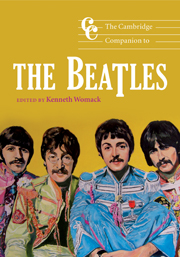Book contents
- Frontmatter
- Introducing the Beatles
- Part I Background
- Part II Works
- 3 Rock and roll music
- 4 “Try thinking more”: Rubber Soul and the Beatles' transformation of pop
- 5 Magical mystery tours, and other trips: yellow submarines, newspaper taxis, and the Beatles' psychedelic years
- 6 Revolution
- 7 On their way home: the Beatles in 1969 and 1970
- 8 Apple Records
- 9 The solo years
- 10 Any time at all: the Beatles' free phrase rhythms
- Part III History and influence
- Notes
- Beatles discography, 1962–1970
- Select bibliography
- Index
6 - Revolution
from Part II - Works
Published online by Cambridge University Press: 28 September 2011
- Frontmatter
- Introducing the Beatles
- Part I Background
- Part II Works
- 3 Rock and roll music
- 4 “Try thinking more”: Rubber Soul and the Beatles' transformation of pop
- 5 Magical mystery tours, and other trips: yellow submarines, newspaper taxis, and the Beatles' psychedelic years
- 6 Revolution
- 7 On their way home: the Beatles in 1969 and 1970
- 8 Apple Records
- 9 The solo years
- 10 Any time at all: the Beatles' free phrase rhythms
- Part III History and influence
- Notes
- Beatles discography, 1962–1970
- Select bibliography
- Index
Summary
After five years of uninterrupted success, in which their achievements as composers, recording artists, and performers had attracted unprecedented levels of attention and acclaim, the Beatles entered 1968 in somewhat uncertain mood. Delighted with the critical impact of Sgt. Pepper, confused by the consequences of Brian Epstein's death, startled at the overwhelmingly negative reactions to Magical Mystery Tour, and separated through their growing involvements in a number of (often film-related) projects, the group – for the first time in their career – seemed to have temporarily mislaid the sense of direction and purpose that had previously distinguished it. This lack of unity gradually became so apparent that it became the defining characteristic of the Beatles' music throughout 1968.
While it was always true that historical and cultural conditions helped to implicitly shape the Beatles' output, the dramatic and divisive events of 1968 created a political context of fragmentation, argument, disunity, confrontation, and disillusionment, which inevitably – and explicitly – found its way into their music. These events included US escalation of the war in Vietnam, following the Tet Offensive launched by the Viet Cong at the start of the year; Czechoslovakia's election of Alexander Dubček as its leader, and its subsequent invasion by the Soviet Union; the assassinations of Martin Luther King and Robert Kennedy; the increasing numbers of student-led demonstrations, rallies, and occupations across Europe; the violent police response to protests at the Democrat convention in Chicago; Irish Catholic marches leading to street battles in Londonderry and military intervention in Northern Ireland; Conservative MP Enoch Powell’s “river of blood” speech and the focus on anti-immigration policies to which it led; the punitive response to the iconic black power salute given by 200- meter medalists Tommie Smith and John Carlos at the Mexico Olympics; and the election of Richard Nixon as US President.
- Type
- Chapter
- Information
- The Cambridge Companion to the Beatles , pp. 112 - 124Publisher: Cambridge University PressPrint publication year: 2009
- 3
- Cited by

